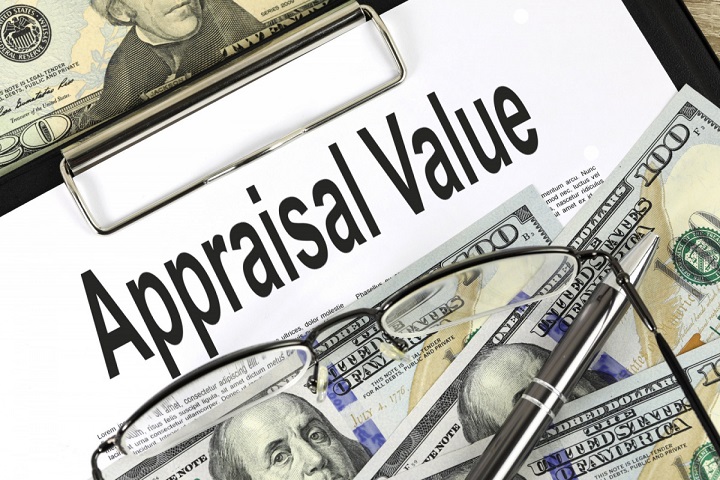You’ve put in your bid for the home you want. Now you await the appraiser’s report. What’s going on behind the scenes?
How the Appraisal Works in Most Cases

The typical home appraisal relies mainly on local sales comparisons, or comps. What will other buyers pay now for a house like the one you’re buying? Whatever price others will pay for similar homes is roughly the value of your new home.
What’s a similar home? The appraiser considers homes within a certain radius of the one you’re buying, with comparable bedroom and bathroom counts, the same or similar size and construction type. Comparable homes have the same school district or a similarly ranked school district, and similar amenities nearby. The appraiser studies and compares sales information and recorded documents for the homes. Homes sold in the last three months are considered the most relevant comparisons.
Even similar properties are unique homes, of course. Therefore, the appraiser will find enough variety in the data to come up with a range of reasonable valuations. Some comparable properties might have been sold for more than the market value, others at below-normal prices, and so forth. Once the outliers are understood for what they are, an appraiser needs to figure out where your desired house fits among slightly more and slightly less costly properties.
The expert’s professional discretion explains why, many times, the appraisal will come back with a valuation very close to the price you offered and the seller has accepted. As long as your agreed-upon purchase price falls within the data-supported range of value calculated by the appraiser, a buyer usually gets an appraisal that matches what the buyer and seller think the home is worth.
What Happens When the Appraisal Value Falls Short

It can happen. A seller who has overvalued the home must lower the price if the appraisal does not support it. If the seller won’t make a price reduction, your purchase contract’s appraisal contingency can save the day. The contingency clause allows buyers to renegotiate for repairs that would support the purchase price. Then, a new appraisal may stand up to your agreement. The appraisal contingency can also allow a buyer to walk away from the deal.
Alternatively, the buyer can make up the difference, using the funds allocated as earnest money. Or the buyer can agree to drop some of the requests made when the parties negotiated their agreement.
We note that an appraisal contingency is always important. That’s why government-backed (FHA or VA) loans build it into their mortgage loan approval contingencies.
But it’s especially important in places where homes are currently experiencing an updraft in bids and sale prices. If the appraiser says the home is worth much less than you’ve agreed to pay, the gap could be a lot for you to make up — and at a time and place where home prices might not be sustainable over time.
For now, the market is red hot. In today’s low-inventory market, homes in popular metro areas are selling for well above their listing prices. Some buyers are willing to win by making cash offers. As Shelby King reports for RealTrends: “With all this money flying around, sellers are accepting sky-high offers from overeager buyers who find they’re at risk of falling into the appraisal gap.”
This situation creates high levels of risk for the buyer to deal with. So, a buyer who does not have a firm appraisal contingency would be wise to ask the real estate agent to help put contractual limits on the amount of “appraisal gap” the buyer may have to pay.
☛ Can you get a home you’ll love on your terms? Here are the top strategies for Succeeding With Contingent Offers in a Seller’s Market.
What the Lender Needs to See
This is the immediate issue. The lender doesn’t want to find a sizeable gap between the appraiser’s new valuation of the home and the higher price you’ve agreed to pay for it. Here’s why:
- The mortgage lender preapproved your loan based on your loan-to-value (LTV) ratio. That’s the loan amount, weighed against the current value of the asset you’re buying.
- Appraisal = V. The current value of the house is determined through the appraiser’s assessment.
- If the appraised value is less than the purchase price, lenders use the lower value when recalculating your LTV ratio.
If the appraisal comes back lower than expected, will the lender be willing to approve the mortgage anyway? That’s unlikely. It would shift an unplanned amount of financial risk to the lender.
So, the seller will need to agree to lower the price to enable you to go through with your purchase. If the seller won’t do so, it’s up to you to fork more cash into your down payment to make up for the appraisal gap. It’s likely the only way you’ll get to keep the loan and interest rate you worked so hard to lock in.
How to Challenge the Appraisal
There’s an appeal procedure for appraisals. Your mortgage specialist can help you submit evidence of value in order to ask the lender to have the appraisal reconsidered. But the appraiser’s report might not be available for 30 days (the federally allowed period for producing it upon request). The seller will need to agree with you to extend the period to closing.
If you and your seller believe it’s worthwhile to appeal the appraisal, the first move could be ordering another appraisal to see if the first one looks off. In any case, the first appraiser must consider and respond to your request for reconsideration. The appraiser’s response should involve examining the new evidence, making a new decision, and providing reasons for changing the valuation or sticking to the prior appraisal results.
When All Else Fails…
Sometimes, you know in your gut that the appraisal doesn’t do justice to the home. Maybe there weren’t enough sales of comparable homes in the immediate area for the appraiser to get a fresh idea of the valuation. If you and the seller are committed to the deal no matter what it takes, you could wait for other nearby sales to occur. If higher prices for comparable houses come into existence, you could get another appraisal and pick up where you left off.
If the appraisal gap is really serious, and you really want the home, you might need to ask your mortgage expert whether a short-term or bridge loan could help you afford the deal. Request a reconsidered valuation after a new set of comparable home sales become available.
But if you can afford to cover the gap, you might just want to kick in the extra money it takes to get your house. If you love the home and you’re locking in a good rate, making up for a low appraisal might not be such a big deal in perspective.
Supporting References
Shelby King for RealTrends.com: Buyers Are Paying to Bridge the Appraisal Gap (Apr. 16, 2021).
Gina Pogol for The Mortgage Reports: My House Appraisal Came in Too Low. What Now? (published May 31, 2019 by Full Beaker, Inc.).
Image credits: Appraisal value banner image by Nick YoungsonCC BY-SA 3.0 via Pix4free; inline image by u_f8awlsnb, via Pixabay.
